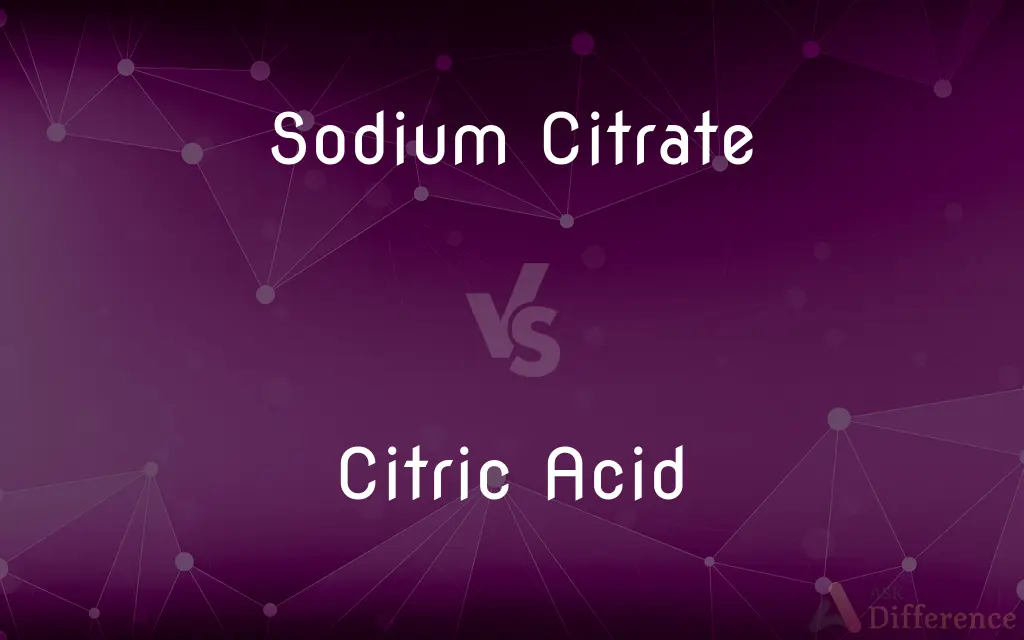Sodium Citrate vs. Citric Acid — What's the Difference?
By Tayyaba Rehman — Published on January 5, 2024
Sodium Citrate is sodium salt of citric acid, generally used as buffering agent or food additive for its salty, less sour taste. Citric Acid, a weak organic acid, is naturally found in citrus fruits and used for its sour flavor and preservative qualities.

Difference Between Sodium Citrate and Citric Acid
Table of Contents
ADVERTISEMENT
Key Differences
Sodium Citrate is derived from Citric Acid and has a salty, slightly tart flavor. It is used to control acidity levels and as a preservative in various food and beverage products. Citric Acid, on the other hand, is known for its distinctly sour taste and is naturally found in citrus fruits like lemons and limes.
In food preparation, Sodium Citrate is often used to add a sour-salt balance and to regulate the pH of foods. Citric Acid is commonly used to add a sharp acidic taste to foods and drinks, enhancing flavor and preserving freshness.
Sodium Citrate also functions as an emulsifying agent in cheeses and dairy products, helping to maintain texture and consistency. Citric Acid is widely used in the canning and preserving of fruits and vegetables, where its acidity inhibits bacterial growth.
In terms of chemical properties, Sodium Citrate is more alkaline compared to Citric Acid, which is a weak organic acid. This difference in pH affects their usage in various applications, including culinary, medicinal, and industrial.
Sodium Citrate has applications in the medical field as an anticoagulant and a buffer to maintain pH in blood samples. Citric Acid is used in cleaning agents and cosmetics, leveraging its natural acidic properties for effectiveness.
ADVERTISEMENT
Comparison Chart
Flavor Profile
Salty, slightly tart.
Distinctly sour.
Common Uses
Food additive for pH control, emulsifying agent.
Flavor enhancer, preservative in foods and beverages.
Natural Occurrence
Synthesized from Citric Acid.
Naturally occurring in citrus fruits.
PH Level
More alkaline.
Weak organic acid.
Industrial and Medicinal Uses
Used as an anticoagulant, buffering agent.
Used in cleaning agents, cosmetics.
Compare with Definitions
Sodium Citrate
It is used as an emulsifier in dairy products.
To maintain the consistency of ice cream, Sodium Citrate is often added.
Citric Acid
Citric Acid acts as an antioxidant in food.
To prevent apples from browning, they were sprinkled with Citric Acid.
Sodium Citrate
Sodium Citrate is a sodium salt of citric acid, used as a food additive.
Sodium Citrate was added to the cheese sauce to improve its smoothness.
Citric Acid
It's widely used in the cosmetic industry.
Citric Acid is a key ingredient in this skincare product for its pH balancing properties.
Sodium Citrate
Sodium Citrate finds applications in the medical field as an anticoagulant.
In blood banks, Sodium Citrate is used to prevent blood clotting in stored samples.
Citric Acid
Citric Acid is a natural preservative found in citrus fruits.
Lemon juice, rich in Citric Acid, was used to preserve the freshness of the fruit salad.
Sodium Citrate
Sodium Citrate has a slightly tart, salty taste.
Sodium Citrate was used to enhance the savory flavor in the soup.
Citric Acid
It adds a sour flavor to food and beverages.
Citric Acid was added to the candy to give it a tart taste.
Sodium Citrate
It acts as a buffering agent to regulate acidity in food products.
Sodium Citrate is used in carbonated beverages to balance the pH level.
Citric Acid
Citric Acid is used in cleaning agents for its acidity.
The kitchen cleaner contains Citric Acid to help remove tough stains.
Common Curiosities
Can Citric Acid be used as an anticoagulant like Sodium Citrate?
No, Citric Acid is not used as an anticoagulant.
Is Sodium Citrate safe as a food additive?
Yes, it is generally recognized as safe when used appropriately.
Is Sodium Citrate naturally occurring?
Sodium Citrate is not naturally occurring; it's synthesized from Citric Acid.
Can Sodium Citrate cause allergies?
It's rare, but some individuals may have sensitivities or allergies to it.
Is Citric Acid harmful to the environment?
Citric Acid is biodegradable and generally not harmful to the environment.
Can Sodium Citrate help with acid reflux?
As an alkaline substance, it may help neutralize stomach acid, but it's not a primary treatment.
How does Citric Acid preserve food?
Citric Acid preserves food by lowering pH and inhibiting bacterial growth.
Can Citric Acid be used to clean surfaces?
Yes, Citric Acid is effective in cleaning products due to its acidic nature.
Is Citric Acid used in soda?
Yes, it's often used to add a tart flavor to soft drinks.
Is Citric Acid good for skin care?
Yes, in the right concentration, it can balance pH and act as an antioxidant.
Is Sodium Citrate vegan?
Yes, Sodium Citrate is vegan as it is chemically synthesized.
Can I substitute Citric Acid for Sodium Citrate in recipes?
Substitution can alter the taste and pH balance, so it's not recommended.
Does Sodium Citrate have a sour taste like Citric Acid?
Sodium Citrate has a less sour, more salty taste compared to Citric Acid.
Does Citric Acid have any nutritional value?
It has some antioxidant properties but is not a significant source of nutrition.
Can Sodium Citrate be used in making cheese?
Yes, it's used as an emulsifier in cheese making.
Share Your Discovery

Previous Comparison
Sugar in the DNA vs. Sugar in the RNA
Next Comparison
Binary Tree vs. Binary Search TreeAuthor Spotlight
Written by
Tayyaba RehmanTayyaba Rehman is a distinguished writer, currently serving as a primary contributor to askdifference.com. As a researcher in semantics and etymology, Tayyaba's passion for the complexity of languages and their distinctions has found a perfect home on the platform. Tayyaba delves into the intricacies of language, distinguishing between commonly confused words and phrases, thereby providing clarity for readers worldwide.
















































